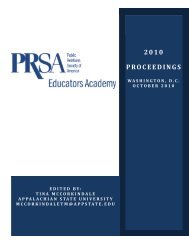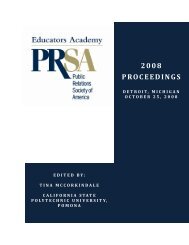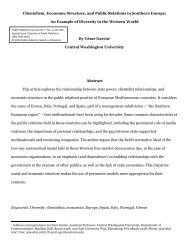2012 PROCEEDINGS - Public Relations Society of America
2012 PROCEEDINGS - Public Relations Society of America
2012 PROCEEDINGS - Public Relations Society of America
Create successful ePaper yourself
Turn your PDF publications into a flip-book with our unique Google optimized e-Paper software.
do good communications work against their will to pr<strong>of</strong>it.‖ They also expressed interest in<br />
understanding ―how managers make ethical decisions.‖<br />
In addition, there was a focus on the need to understand the ethical course <strong>of</strong> action for<br />
social media dilemmas: ―With the rise <strong>of</strong> social media as a dominant outlet for our industry.<br />
…we need to be well versed in the emerging media and the hypothetical dilemmas that may<br />
arise.‖ Similarly, a participant explained, ―I think lines are blurrier than ever with new media. …<br />
There needs to be a loud discussion, a media campaign maybe, to make modern PR ethics a key<br />
industry topic, more than just pointing out the bad examples.‖ Another practitioner disagreed,<br />
explaining that companies and agencies will learn the ethics <strong>of</strong> social media as they get punished<br />
for transgressions, such as ―the fake Wal-Mart blog created by another agency a few years ago.‖<br />
Discussion<br />
Ethical Issues in Agencies<br />
The results <strong>of</strong> the first research question point to the persistence <strong>of</strong> a variety <strong>of</strong> ethical<br />
issues, especially those involving client management and social media. Other areas include gift<br />
giving, ghostwriting, voting for clients in contests, and performing work that conflicts with<br />
personal beliefs. One possible reason why client management was the most significant source <strong>of</strong><br />
ethical problems for participants is that people think they can get away with it, which reinforces<br />
the importance <strong>of</strong> the recommendation to hold individuals accountable for their decisions (Lee &<br />
Cheng, 2011). Some agencies hold their employees accountable for poor client management<br />
practices, which was evidenced by participants‘ descriptions <strong>of</strong> people getting fired. The<br />
potential concealment <strong>of</strong> unethical client management practices suggests that clients might<br />
consider asking more questions <strong>of</strong> their agencies based on the problems described in the results,<br />
such as confirming who is doing which work on an account team.<br />
Requests for Support<br />
In response to the second research question, many Millennials focused on the importance<br />
<strong>of</strong> ethical training by educators, employers, and public relations associations, although some<br />
participants did not think further training would help. Some Millennials explained that the<br />
content <strong>of</strong> ethics classes and codes must be consistent with what an agency actually does, which<br />
is the same thing that many senior public relations executives expressed in a recent study<br />
(see Lee & Cheng, 2011). One reason why ethics codes and classes can be useful to Millennials<br />
is that they can use the content to persuade their supervisors to do the right thing. Previous<br />
research suggests that Millennials want to be mentored and groomed for senior positions<br />
(Gallicano, <strong>2012</strong>), so approaches that tie ethical training into mentorship and pr<strong>of</strong>essional<br />
development are advised.<br />
Dissent<br />
Although Millennials sometimes observed ethical infractions, in many cases (even<br />
outside <strong>of</strong> social media), they stood their ground, which provides good news in light <strong>of</strong> research<br />
that suggests that practitioners under the age <strong>of</strong> 30 are less likely than other generations to<br />
express dissent (Berger & Reber, 2006). This study provides preliminary evidence that many<br />
young practitioners stand their ground at times, even if young practitioners speak out less <strong>of</strong>ten<br />
than seasoned pr<strong>of</strong>essionals. The contextual details <strong>of</strong> this study explain why young practitioners<br />
speak out less <strong>of</strong>ten, beyond the initial explanation <strong>of</strong>fered by Berger and Reber (2006) about not<br />
wanting to rock the boat. In addition to this explanation, young practitioners also speak out less<br />
<strong>of</strong>ten when they perceive a decision to be out <strong>of</strong> their hands, which could help explain why<br />
Millennial respondents to a survey tended to duck ethical dilemmas when possible (Curtin et al.,<br />
42
















